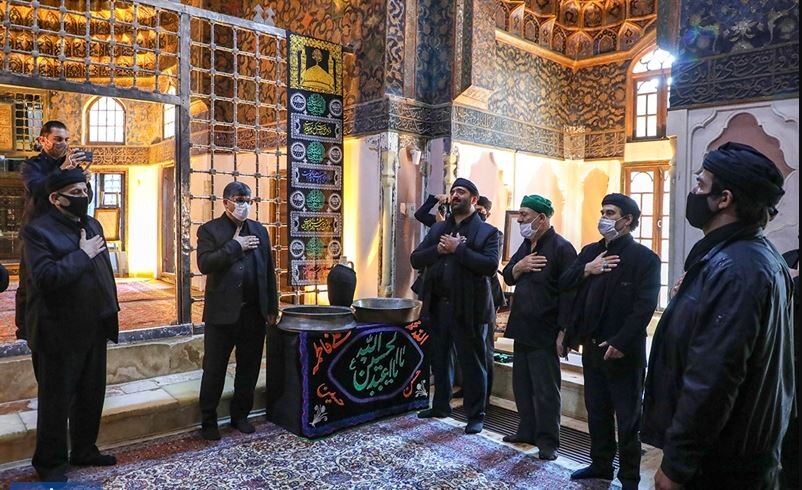Tasht Gozari ritual held observing health protocols

TEHRAN – The annual Muharram ritual of Tasht Gozari was held at the UNESCO-registered Sheikh Safi al-Din Khanegah and Shrine Ensemble in the northwestern province of Ardebil on Wednesday, observing health protocols and social distancing rules.
Iranians, who are mostly Shia Muslims, hold special ceremonies during the first ten days of the lunar month of Muharram, which began on Friday, to commemorate the martyrdom anniversary of Imam Hussein (AS), the grandson of Prophet Muhammad (PBUH) and his 72 loyal companions.
While Iran is still fighting the coronavirus outbreak, this year’s Muharram mourning rituals across the country would be different from previous years.
Tasht Gozari is one of the most popular rituals in Ardebil and nearby cities. People gather mostly in the Jame Mosque of the city and fill some big washtubs with water and put them in a corner of the mosque. Mourners then start the ceremony with Sineh-Zani [beating the chest] according to the rhythm of a sung eulogy.
After the ceremony, some men put the washtubs on their heads and turn them among the people so that they can drink the water, which is considered blessing water.
Despite the shortage of water, Imam Hussein (AS) asked his companions to pour water they bring with themselves in washtubs for Al-Hurr ibn Yazid al Tamimi, a commander of Yazid’s army, and his companions. This sacrifice made Hurr choose Imam Hussain (AS) over Yazid and fight for him.
Tasht Gozari ritual is usually held in three days, however, this year the ceremony was limited and with less time due to the coronavirus outbreak.
The Sheikh Safi al-Din Khanegah and Shrine Ensemble is named after Sheikh Safi al-Din Ardebili (1253-1334), who was a Sufi philosopher and leader of Islamic mystic practices. Developed between the early 16th century and the end of the 18th century, this place of spiritual retreat enjoys principal elements of traditional Iranian architecture to make the best use of existing space for accommodating a variety of functions.
Sprawling on a high, windswept plateau, whose altitude averages 3,000 meters above sea level, Ardebil is well-known for having lush natural beauties, hospitable people, and its silk and carpet trade tradition.
ABU/MG
